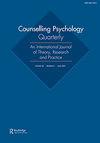Therapists’ questions to clients about what might be helpful can be supportive without being directive: a conversation analysis
IF 1.5
Q3 PSYCHOLOGY, APPLIED
引用次数: 3
Abstract
ABSTRACT Shared decision-making about therapeutic methods has been proposed as a way of conceptualising, and assisting, collaboration in the therapeutic alliance. However, little is known about how psychotherapists actually create concrete, moment-by-moment opportunities for clients to share their ideas about what might be therapeutically helpful. We used conversation analysis to examine psychotherapists’ questions about what might be helpful in audio-recordings of early sessions of a collaborative-integrative therapy. We examined forty-two sessions involving seven dyads and identified 28 cases of questions either inviting clients’ ideas about helpful in-therapy methods or strategies outside the therapy room. Psychotherapists could invite clients’ ideas by using simple questions, however clients could find such questions problematic. Alternatively, psychotherapists could add scaffolding: offering support to the client in terms of how they might respond. However, this could erode clients’ autonomy to respond with their own ideas. We identified a conversational practice, de-specifying, which overcomes this dilemma: asking questions and providing scaffolding whilst also lessening the pressure on the client to go along with that scaffolding. A therapeutic style which includes scaffolding and de-specifying practices creates an opportunity for the client to contribute where clients are empathically supported, but not directed, in responding.治疗师向客户提出的关于什么可能有用的问题可以在没有指导的情况下提供支持:对话分析
关于治疗方法的共同决策已被提出作为概念化和协助治疗联盟合作的一种方式。然而,对于心理治疗师实际上如何创造具体的、时时刻刻的机会,让客户分享他们关于什么可能对治疗有帮助的想法,人们知之甚少。我们使用对话分析来检查心理治疗师的问题,即在协作-整合治疗的早期阶段录音中可能有什么帮助。我们检查了涉及7对夫妇的42次会议,并确定了28个问题案例,这些问题要么是邀请客户关于有用的治疗方法的想法,要么是在治疗室之外的策略。心理治疗师可以通过简单的问题来激发来访者的想法,然而来访者可能会觉得这些问题很成问题。或者,心理治疗师可以增加脚手架:根据客户的反应提供支持。然而,这可能会削弱客户以自己的想法回应的自主权。我们确定了一种会话练习,去指定,它克服了这个困境:提出问题和提供框架,同时也减轻了客户跟着框架走的压力。包括脚手架和去指定实践的治疗风格为客户创造了一个贡献的机会,在这种情况下,客户得到同情的支持,而不是直接回应。
本文章由计算机程序翻译,如有差异,请以英文原文为准。
求助全文
约1分钟内获得全文
求助全文
来源期刊

Counselling Psychology Quarterly
PSYCHOLOGY, APPLIED-
CiteScore
6.20
自引率
6.70%
发文量
30
期刊介绍:
Counselling Psychology Quarterly is an international interdisciplinary journal, reporting on practice, research and theory. The journal is particularly keen to encourage and publish papers which will be of immediate practical relevance to counselling, clinical, occupational, health and medical psychologists throughout the world. Original, independently refereed contributions will be included on practice, research and theory - and especially articles which integrate these three areas - from whatever methodological or theoretical standpoint. The journal will also include international peer review commentaries on major issues.
 求助内容:
求助内容: 应助结果提醒方式:
应助结果提醒方式:


